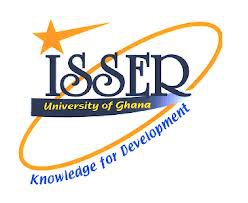- Home - News
- TWI News | TV
- Polls
- Year In Review
- News Archive
- Crime & Punishment
- Politics
- Regional
- Editorial
- Health
- Ghanaians Abroad
- Tabloid
- Africa
- Religion
- Election 2020
- Coronavirus
- News Videos | TV
- Photo Archives
- News Headlines
- Press Release
Business News of Friday, 11 September 2015
Source: GNA
ISSER launches 2014 state of the economy report
 ISSER logo
ISSER logo
The Institute of Statistical Social and Economic Research (ISSER) has launched the 2014 state of the economy report which also looked at the state of infrastructure in Ghana.
The report launched in Accra, contained empirical evidence on how best to manage the nation’s infrastructure, to enable policy makers to take the right decisions.
Professor Felix Asante, Director and Coordinator, State of Ghana Economic Report, giving an overview said there was precipitous decline in industrial growth between 2013 and 2014, which was worrisome given the country's quest for industrialization.
Disaggregating the growth pattern, Prof. Asante said the service sector registered growth rate of 5.6 per cent in 2014 down from 10.0 per cent in 2013.
He said despite the sector’s decline in growth in 2014; it still remained the largest sector with a share of 49.6 per cent of Gross Domestic Product, falling only marginally from its 2013 share of 49.8 per cent.
The industrial sector, which is the second largest sector, grew even much slower at 0.8 per cent in 2014, down from 6.6 per cent in 2013, adding that, growth of the agriculture sector also fell from 9.7 per cent in 2013 to 4.6 per cent in 2014.
"The growth rates of all the three sectors fell between 2013 and 2014, however with the strongest growth in 2014 being in services, followed by agriculture and then distantly by industry, this permutation is different from 2013, when the strongest growth was also recorded in services but followed by industry," he noted.
Prof. Asante said the inability of the Ghanaian economy to sustain its growth momentum is an issue of concern.
He said despite the solid growth of agriculture in recent years, its contribution to national output continued to decline, adding that, this has been the trend since the sector peaked at 31.8 per cent of GDP in 2009.
He said the sector again experienced a slight decline in its share of GDP to 22.0 per cent in 2014 compared to 22.4 per cent in 2013.
On the outlook for Ghana’s economy and the way forward, Prof. Asante said despite the projected slight improvement in economic growth in the global economy in 2015 and 2016, Ghana’s growth rate is projected to fall in 2015 but then rise in 2016 (IMF, 2015a).
Prof. Asante said this scenario is in concert with the projected pattern for sub-Sahara Africa, adding that, structural limitations in infrastructure, labour markets and declining commodity prices contribute greatly to the slowdown in the growth momentum in many emerging and developing countries, including Ghana.
He said the near term for Ghana seems quite bleak, given the infrastructural challenge, particularly in the energy sector.
Prof. Asante explained that infrastructural challenge remains daunting, as amplified at least by the on-going energy problem, indicating that, Ghana needs to undertake a serious prioritization of its public finance, which entails major political decisions.
Mr Ebenezer Asante, Chief Executive Officer of MTN, who launched the report, urged the private sector to partner public sector institutions like the ISSER for national development.










